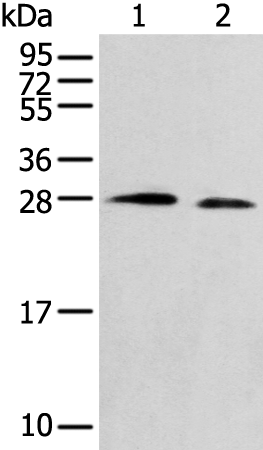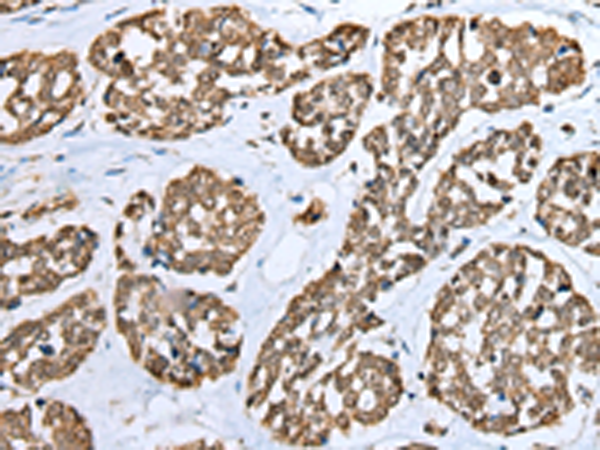


| WB | 咨询技术 | Human,Mouse,Rat |
| IF | 咨询技术 | Human,Mouse,Rat |
| IHC | 1/25-1/100 | Human,Mouse,Rat |
| ICC | 技术咨询 | Human,Mouse,Rat |
| FCM | 咨询技术 | Human,Mouse,Rat |
| Elisa | 1/5000-1/10000 | Human,Mouse,Rat |
| Aliases | p24; p25; TPPP1; TPPP/p25; p25alpha |
| WB Predicted band size | 24 kDa |
| Host/Isotype | Rabbit IgG |
| Antibody Type | Primary antibody |
| Storage | Store at 4°C short term. Aliquot and store at -20°C long term. Avoid freeze/thaw cycles. |
| Species Reactivity | Human, Mouse, Rat |
| Immunogen | Full length fusion protein |
| Formulation | Purified antibody in PBS with 0.05% sodium azide and 50% glycerol. |
+ +
以下是关于TPPP抗体的3篇参考文献及其摘要概括:
---
1. **《Tubulin Polymerization Promoting Protein (TPPP) in Multiple System Atrophy: A Potential Biomarker》**
- **作者**: Kovács, G.G. 等 (2019)
- **摘要**: 本研究开发了一种高特异性的TPPP抗体,用于检测多系统萎缩(MSA)患者脑脊液中的TPPP水平。研究发现,TPPP在MSA患者中显著升高,可能作为区分MSA与其他神经退行性疾病(如帕金森病)的生物标志物。
---
2. **《TPPP/p25 in Glial Cytoplasmic Inclusions: A Link to Neurodegenerative Disorders》**
- **作者**: Song, Y. 等 (2021)
- **摘要**: 通过免疫组化和TPPP抗体标记,研究揭示了TPPP在胶质细胞质包涵体(GCIs)中的异常聚集,与α-突触核蛋白共定位。结果表明,TPPP可能参与神经胶质细胞病理过程,为MSA的发病机制提供新见解。
---
3. **《Immunoreactivity of Anti-TPPP Antibodies in Synucleinopathies》**
- **作者**: Wakabayashi, K. 等 (2020)
- **摘要**: 该研究利用TPPP抗体分析不同突触核蛋白病(如MSA、路易体痴呆)的脑组织样本,发现TPPP免疫反应性与疾病特异性病理特征高度相关,提示其在神经病理诊断中的潜在应用价值。
---
以上文献聚焦于TPPP抗体的开发、病理机制研究及临床应用,为神经退行性疾病的诊断和机制探索提供了重要参考。
TPPP (Tubulin Polymerization Promoting Protein) antibodies target a family of proteins involved in microtubule dynamics and cytoskeletal organization. TPPP proteins, particularly TPPP/p25 and TPPP3. are highly expressed in oligodendrocytes and ciliated cells, playing roles in myelination, cell differentiation, and ciliary function. TPPP/p25 is notable for its association with α-synuclein in pathological aggregates found in neurodegenerative disorders like multiple system atrophy (MSA) and Parkinson’s disease, suggesting its involvement in disease mechanisms.
Antibodies against TPPP are critical tools in neuroscience research, enabling the detection of TPPP expression patterns, protein interactions, and pathological inclusions. They are widely used in techniques such as immunohistochemistry, Western blotting, and immunofluorescence to study TPPP's physiological roles and its dysregulation in diseases. In diagnostic contexts, TPPP antibodies help identify MSA-specific pathological features, differentiating them from other synucleinopathies. Additionally, emerging studies explore TPPP's potential as a biomarker or therapeutic target, given its dual role in cytoskeletal integrity and disease-associated aggregation. Research continues to clarify TPPP isoforms' distinct functions and their implications in both neurological disorders and cancer biology.
×